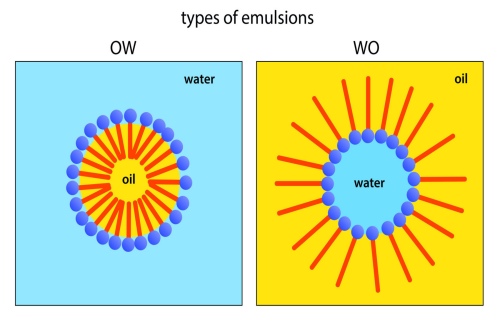How Emulsifiers Enhance Texture and Stability in Food Manufacturing
How Emulsifiers Enhance Texture and Stability in Food Manufacturing
Blog Article
The Scientific research Behind Emulsifiers and Their Significance in Modern Manufacturing
Emulsifiers play an important function in contemporary manufacturing, acting as the unrecognized heroes that mix oil and water for a vast variety of items. As customer preferences shift towards cleaner tags, the demand for ingenious emulsifiers is expanding.
What Are Emulsifiers?
Emulsifiers are crucial representatives in the world of food and item production, acting as the glue that binds two otherwise immiscible liquids, like oil and water. Typical examples consist of lecithin found in egg yolks and soybeans, and mono- and diglycerides utilized in different refined foods.

When you whip up a salad clothing or delight in a velvety dessert, emulsifiers aid preserve that perfect structure. They assure your products have a constant mouthfeel and look, improving your overall experience. Without emulsifiers, many foods would divide, leading to unwanted textures and tastes. Following time you enjoy a smooth sauce or spread, remember the unrecognized heroes-- emulsifiers-- that make it all feasible.
The Chemistry of Emulsification
When you blend oil and water, you may observe they do not blend easily; that's where the chemistry of emulsification enters into play. Emulsification happens when little beads of one liquid disperse in another, creating a stable combination. This happens because oil and water are immiscible as a result of their differing polarities-- water is polar while oil is non-polar. To conquer this difficulty, emulsifiers are employed.
When you add an emulsifier, its particles position themselves at the oil-water user interface, decreasing surface area tension and allowing the droplets to blend. The emulsifier creates a safety layer around each bead, stopping them from coalescing back into separate layers.
Sorts Of Emulsifiers
Different sorts of emulsifiers play vital roles in stabilizing combinations of oil and water. You'll commonly experience two primary classifications: all-natural and artificial emulsifiers. Natural emulsifiers, like lecithin from egg yolks or soy, are derived from plants and pets, making them popular in food items. They're generally thought about much safer and much healthier options.
On the various other hand, synthetic emulsifiers, such as mono- and diglycerides, are chemically crafted to boost stability and life span. They're commonly used in processed foods and cosmetic products.
In addition, you might discover non-ionic, anionic, and cationic emulsifiers, each with unique residential or commercial properties that affect their efficiency. Non-ionic emulsifiers, for instance, work well in a wide variety of pH degrees, while anionic emulsifiers have a tendency to carry out much better in alkaline conditions. Comprehending these types can help you select the ideal emulsifier for your particular application.
Systems of Emulsion Formation
Comprehending just how solutions form is important for developing steady combinations of oil and water. Solutions happen when you spread little beads of one fluid right into another immiscible fluid, such as oil in water. This procedure requires energy, frequently provided via frustration or blending. When you introduce an emulsifier, it decreases the surface tension between both fluids, permitting them to mix even more conveniently.
The emulsifier molecules have a hydrophilic (water-attracting) head and a hydrophobic (oil-attracting) tail. When you add an emulsifier, these molecules arrange themselves at the oil-water user interface. The hydrophilic heads communicate with water, while the hydrophobic tails anchor right into the oil. This produces a barrier that supports the beads, preventing them from integrating.
Applications of Emulsifiers in Numerous Industries
Emulsifiers play an important role throughout various sectors, making your favored foods smoother and more satisfying. In cosmetics, they enhance item texture and stability, ensuring a positive application experience. Plus, in drugs, they assist supply important ingredients properly, enhancing general efficacy.
Food Industry Makes Use Of
While you might not realize it, emulsifiers play a crucial role in his response the food market, enhancing the structure, security, and rack life of several items. In baked products, emulsifiers enhance dough handling and retain wetness, resulting in a better appearance and prolonged quality. By making certain uniformity and top quality, emulsifiers are considerable to supplying the tasty products you take pleasure in every day, click this site making them an important component in contemporary food production.
Aesthetic Formulas Advantages
When it comes to aesthetic formulations, emulsifiers are important for creating products that feel elegant and do properly. You'll see that emulsifiers improve item stability, protecting against splitting up and lengthening shelf life. On the whole, emulsifiers play an important role in delivering premium cosmetic items that satisfy your charm needs.
Pharmaceutical Applications Introduction
In the pharmaceutical industry, emulsifiers are necessary for formulating effective medicines. They help create steady combinations of oil and water, guaranteeing that active ingredients are uniformly dispersed and conveniently soaked up by the body. You'll locate emulsifiers in different dose kinds, like lotions, lotions, and liquid suspensions, boosting the bioavailability of medicines. They additionally boost the texture and security of items, making them extra attractive and simpler to use.
The Impact of Emulsifiers on Item Top Quality

By ensuring steady solutions, you reduce the threat of putridity and prolong shelf life, ultimately saving you time and money. You'll likewise discover that emulsifiers can enhance the bioavailability of energetic components in your items, making them extra reliable for consumers.
In addition, they allow you to develop cutting-edge solutions that fulfill diverse customer demands. Whether you're crafting a creamy clothing or a luxurious lotion, emulsifiers are essential for achieving the look what i found desired results. Simply put, by comprehending and leveraging the influence of emulsifiers, you can considerably boost the quality of your products.
Future Trends in Emulsifier Advancement
As the need for cleaner labels and lasting products rises, the development of new emulsifiers is set to progress substantially. You'll see a change in the direction of plant-based and natural emulsifiers, driven by customer preferences for active ingredients that are eco friendly and less processed. Technologies in biotechnology will likely enhance the performance and performance of these emulsifiers, permitting manufacturers to create stable formulations with fewer additives.
You may likewise see a rise in multifunctional emulsifiers that not only stabilize solutions however likewise improve taste, appearance, or nutritional value. This trend can streamline ingredient listings while boosting item efficiency.
Additionally, with developments in nanotechnology, emulsifiers might be engineered at the molecular level to achieve unprecedented security and performance. Emulsifiers. As you discover these trends, you'll locate that the future of emulsifier development is not nearly performance, however additionally about accepting sustainability and openness in components
Frequently Asked Concerns
Are Emulsifiers Safe for Usage in Food Products?
Yes, emulsifiers are typically risk-free for consumption in food. They've been extensively studied and authorized by food safety and security authorities, so you can appreciate your favorite foods without bothering with their effect on your health and wellness.
Can Emulsifiers Be Derived From Natural Resources?
Yes, you can acquire emulsifiers from natural sources. Ingredients like lecithin from egg yolks or soybeans and casein from milk prevail. These natural emulsifiers aid stabilize combinations without artificial additives, making them popular in different products.

How Do Emulsifiers Affect Shelf Life of Products?
Emulsifiers stabilize mixes, avoiding splitting up and spoilage - Emulsifiers. By maintaining harmony, they prolong products' life span, making sure freshness and top quality. You'll see that emulsifiers help maintain your favored foods and cosmetics executing more than time
What Are Possible Side Results of Emulsifiers?
You could experience digestion issues when consuming items with emulsifiers, as they can disrupt intestine bacteria. Some researches recommend potential web links to inflammation or allergies, but extra research is needed to completely understand these impacts.

Are There Alternatives to Typical Emulsifiers?
Yes, there are options to standard emulsifiers. You can discover choices like all-natural periodontals, starches, or lecithin. Each different offers one-of-a-kind residential properties, so experiment to find what works best for your specific application.
Report this page